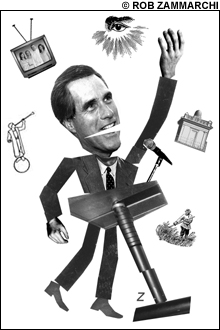
WHERE IS THE (BIG) LOVE?: Kennedy sidelined his Catholicism. But if Romney were president, would his loyalty to the Constitution really trump his loyalty to the Church of Jesus Christ of Latter-day Saints?
|
About two months before the heated 1960 election, John F. Kennedy tried to put to rest the whole debate over his Catholicism to beat Richard Nixon. It was in Houston on September 12 when he famously hit the issue head-on: ‘No public official either requests or accepts instructions on public policy from the pope.’ Now, 46 years later, Massachusetts has coughed up another presidential hopeful who belongs to what some see as a weird religion — the Church of Jesus Christ of Latter-day Saints. And the candidate, Republican Gov. Mitt Romney, plans to copy, almost exactly, JFK’s winning approach. Romney says he’ll give a similar address, in which he will pledge allegiance to the Constitution, not the Mormon church. It will be a simple approach: Explain the religion, maybe touch on the banned practice of polygamy, then ask voters to judge him on his years in business, as head of the 2002 Winter Olympics in Salt Lake City, and as the Bay State’s governor.
—U.S. News & World Report, May 8, 2006
Sorry, Mitt, but the JFK approach isn’t going to cut it. When Kennedy ran for president, most Americans accepted the notion that religion and politics should remain separate. Those days are gone — witness your own religious boasts during a recent visit to South Carolina, a key primary state chock-a-block with conservative Evangelicals. (“I believe Jesus Christ is my savior,” you said. “I believe in God. I’m a person of faith and I believe that’s the type of person Americans want.”) What’s more, Mormonism is more of an unknown quantity to voters than Catholicism was back in Kennedy’s day. And unlike Kennedy, you’ve been extremely active in your church, previously serving as bishop of your Belmont church and as Boston-area stake president (a lay post comparable to a Catholic archbishop).
For all these reasons — not to mention HBO’s Big Love, which has put polygamy at the forefront of the pop-culture universe — people won’t be satisfied with the facile discussion you’re apparently planning to have. If you really want to explain Mormonism to the electorate once and for all, you’ll need to deal candidly with some thorny issues. Get ready to discuss the following awkward subjects — or to have others discuss them for you.
The obedience question
So, your loyalty to the Constitution trumps your loyalty to the Church of Jesus Christ of Latter-day Saints. That tells us what you’ll do if these two allegiances ever conflict. Broadly speaking, though, what kind of relationship would you have — as president of the United States — with LDS leadership?
Here’s the problem: many Mormons feel they have to comply with any request made by the church’s president, Gordon Hinckley, who functions as a direct conduit to God. (At LDS.org, the church’s Web site, Hinckley is described as a “ Living Prophet ” who’s following in the path of Abraham, Moses, and Joseph Smith .)